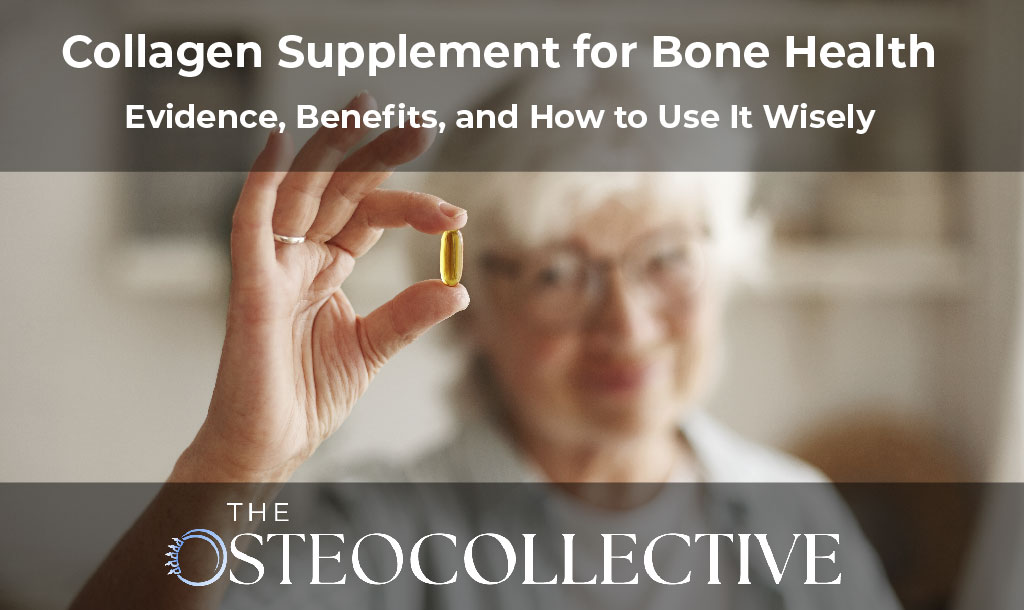live better, longer

Bone health is one of the most important — and most overlooked — aspects of healthy aging. For millions of women and men, the diagnosis of osteopenia or osteoporosis can feel overwhelming. At The OsteoCollective, Dr. Doug Lucas teaches that the path forward isn’t about a single nutrient, pill, or quick fix. It’s about building a comprehensive strategy that supports both the mineral and protein framework of bone.
That’s where collagen comes in. While most people think of collagen in terms of glowing skin, strong hair, or healthy joints, collagen is actually the primary protein in your bones. The question many people ask is: does taking a collagen supplement really improve bone health?
In this article, we’ll unpack:
Bones aren’t just lifeless minerals. They are dynamic, living tissue made of both minerals and protein. About 30–50% of bone volume is protein, and nearly 90% of that protein is collagen. Collagen acts as the scaffolding or framework that holds bone minerals like calcium and phosphorus in place.
This structure provides two things bones absolutely need:
Unfortunately, your body’s ability to make collagen naturally declines starting in your mid-20s, with a sharper drop in your 40s and beyond. For women, menopause accelerates this process, as estrogen decline is linked with faster bone breakdown.
As Dr. Doug often says:
“Bone density is important, but density alone doesn’t prevent fractures. Collagen provides the flexibility and quality your bones need to stay resilient.”
Collagen peptides — small, bioavailable fragments of collagen — have been studied for their effects on bone health. The results are encouraging, but also nuanced. Collagen is not a miracle cure, but it can be a valuable tool within a bigger plan.
One of the most important lessons from these studies is that collagen may not always show dramatic jumps in bone density on DEXA scans — especially in the short term. But it does shift bone turnover markers:
A better ratio between these two markers means your bones are building more tissue than they are losing — exactly what you want.
As Dr. Doug emphasizes in OsteoCollective teaching:
“DEXA scans give us a snapshot, but bone turnover markers tell us the story of what’s really happening inside your bones.”
Not all collagen supplements are the same. Here’s what Dr. Doug recommends to patients and OsteoCollective members:
“When it comes to supplements, quality is everything. The wrong product may do nothing at best — or harm you at worst. Stick with research-backed, third-party tested collagen.” — Dr. Doug Lucas
At OsteoCollective, collagen is taught as one supportive piece of a much larger strategy. Here’s how it fits:
Dr. Doug stresses that exercise is the single most powerful bone-building lever we have.
Collagen provides the raw materials. Exercise provides the signal to use them. Nutrients provide the minerals and cofactors to complete the structure.
Collagen peptides are generally safe and well tolerated. Side effects are rare and usually mild (digestive upset, minor taste issues). Allergic reactions are uncommon but possible with marine collagen.
The bigger concern is sourcing. If collagen comes from poorly raised animals or unregulated processing, you could be concentrating contaminants like heavy metals or pesticides.
That’s why Dr. Doug emphasizes:
Dr. Doug’s guidance is built on years of experience as an orthopedic surgeon, where he saw the devastating impact of fractures on quality of life. That experience drove him to pivot into functional medicine, where his expertise now focuses on prevention, bone density imaging beyond DEXA, and root-cause solutions.
As the founder of OsteoCollective, Dr. Doug has built a trusted educational community where patients learn not just about supplements like collagen, but also about diet, exercise, hormones, and long-term lifestyle strategies. His teaching balances honesty with optimism:
1. Does collagen really help bone density?
Yes — clinical trials show modest but meaningful gains in lumbar spine and hip bone density, and improvements in bone turnover markers, when collagen is taken consistently.
2. How long do I need to take collagen to see results?
Most studies run for 12 months, but benefits continue to build with long-term use (2–4 years).
3. Can collagen reverse osteoporosis?
Collagen alone will not reverse osteoporosis, but it can be part of a multi-layered plan that includes exercise, nutrition, and sometimes medication.
4. What’s the safest way to choose a collagen supplement?
Look for Type I collagen peptides, 5–10g/day, with third-party purity testing and preferably a brand with published clinical data.
So, is a collagen supplement for bone health worth it? Yes — when it’s high quality, research-backed, and combined with a comprehensive bone health plan.
The evidence shows collagen peptides can improve bone turnover markers, provide modest density gains, and strengthen the organic matrix that gives bones resilience. But collagen works best as part of a system that includes exercise, protein-forward nutrition, essential nutrients, and lifestyle changes.
As Dr. Doug often says:
“A diagnosis of osteoporosis isn’t the end. It’s the beginning of your journey to rebuild, strengthen, and take control of your bone health.”
👉 To learn more and join a supportive community led by Dr. Doug, explore resources at OsteoCollective.com.
Join us LIVE February 17th, 2026 at 4:00pm EST to Learn Dr. Doug's proven framework for Osteoporosis Reversal for FREE. Yes! Reversing Osteoporosis is possible and has happened for hundreds of Dr. Doug's patients.
If you have been blind-sided, feel stuck, confused, and exhausted with your diagnosis, this Masterclass is for you!
*By providing your phone number, you agree to receive text messages related to webinar reminders, promotional offers, updates, and important announcements from The Osteocollective. Message and data rates may apply. Consent is not a condition of purchase.You may unsubscribe at any time by replying STOP.
We hate spam and promise to keep your email address and phone number safe.
x